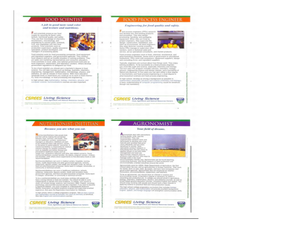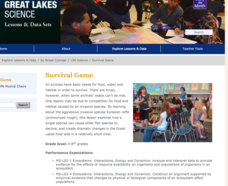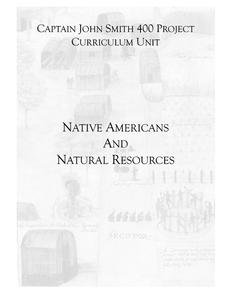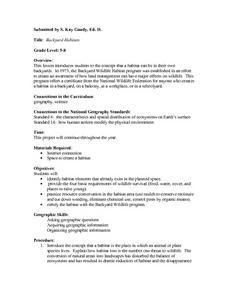Curated OER
Pesticide Watch Card
Students examine human health by identifying dangerous pesticides. In this agriculture instructional activity, students research the food production system in the United States and discuss dangers such as pesticides, chemicals and...
Smithsonian Institution
Strength in Solidarity: Coalition of Immokalee Workers and the Campaign for Fair Food
Not all food is created equal. The lesson dives into the world of migrant farm workers to show their struggles to earn livable wages and better working conditions. Academics learn why the Coalition of Immokalee Workers was created and...
Channel Islands Film
Human Impact on the Food Web of Santa Cruz Island
What happens when a non-native species is introduced onto an island? Santa Cruz Island, part of the Channel Island chain located off the coast of southern California, provides the perfect laboratory for young environmental scientists to...
Curated OER
Who Works for Nonprofit Organizations? (6-8)
Students explore career opportunities in the nonprofit sector. In this career exploration lesson, students listen to guest speakers who work for nonprofit organizations explain their jobs. Students also examine the role of nonprofit...
Curated OER
Food Chain/Food Web
Students explore ecosystems. In this ecology lesson, students read an article explaining ecosystems. Students create a visual organizer with index cards using components of various ecosystems.
Curated OER
Using Details from the Text
Explore non-fiction comprehension strategies with your class. They will visualize daily activities and label a 4 circle Venn diagram with related phrases. They must identify the overlapping sections as "main ideas," then complete a...
Curated OER
Forest Food Chains and Webs
Students explore forest ecological systems. In this ecology lesson, students classify forest plants and animals according to their ecological roles. Students play a related vocabulary guessing game. Students choose a card on which...
Curated OER
Michigan Food: From Farm to You
Learners recognize Michigan on a map and understand how its climate is affected by the Great Lakes. In this Michigan food lesson, students play a trivia game to identify the produce of Michigan. Learners relate the climate in each part...
Curated OER
Breakfast for Champions
Students prepare an event to honor philanthropic activities in their community. In this common good lesson plan, students send out invitations to local non-profits or to those who engage in philanthropic activities and plan an awards...
Curated OER
Service Learning Project
Students plan a service project to contribute to their community and then reflect on their experience. In this service project activity, students help in a food pantry or donation center in their community. Students then write statements...
Curated OER
The Void Filled by Nonprofits
Students examine the significance of nonprofit organizations in a democratic society. They conduct research on a selected nonprofit organization, complete a questionnaire, and present their findings to the class.
Curated OER
Exploring Countries and Cultures
Fifth graders choose a country associated with a family member and research its location, government, language, economy, history, holidays, foods, sports, and famous people. They write to inform using this data and draw a map identifying...
Michigan Sea Grant
Survival Game
Musical chairs may be a classic game, but Ruffe Musical Chairs is a unique lesson on invasive species! Using the time-honored game, pupils role play the behaviors of the invasive fish called Eurasian ruffe. Learning about this aggressive...
Albert Shanker Institute
Economic Causes of the March on Washington
Money can't buy happiness, but it can put food on the table and pay the bills. The first of a five-lesson unit teaches pupils about the unemployment rate in 1963 and its relationship with the March on Washington. They learn how to create...
Curated OER
Volunteering Our Time
Students participate in a service learning project. In this philanthropy lesson, students volunteer their time at a local soup kitchen and reflect upon the experience in a journal.
Curated OER
Native Americans and Natural Resources
North American Indian civilizations had already been in place for over 10,000 years before the arrival of European settlers. Introduce your young historians to Indian tribes that lived in the Chesapeake region in the...
Curated OER
Disaster Relief - Power, Generosity and Leadership
Students explore the concept of philanthropy. In this service learning instructional activity, students discover philanthropy's role in 4 economic sectors. Students examine how organizations responded to the Hurricane Katrina devastation...
Curated OER
Backyard Habitats
Students identify habitat elements. They create a habitat in a backyard, on a balcony, at a workplace, or in a schoolyard and provide the four basic requirements of wildlife survival (food, water, cover, and places to raise young). They...
ProCon
Prescription Drug Ads
Bayer Pharmaceuticals sold heroin as a cough medicine in the 1900s ... who knew? Scholars discover this, and other interesting facts, when they use the resource to prepare for a class discussion or debate. They browse videos, readers'...
Channel Islands Film
Sa Hi Pa Ca (Once Upon a Time): Lesson Plan 2
What tools do archaeologists and anthropologist use to learned about what life was like in the past. After watching West of The West's documentary Once Upon a Time that details how scientists use artifacts to establish a...
Curated OER
Share Your Bread
Students understand how they can participate to help people in need. In this tzedakah lesson, students organize a charity collection of food, coats, toys, or canned good. Students present information about their drive in groups of two...
Curated OER
We are all Responsible
Pupils desribe the interdependence between humans and nature and positive behavior with regards to natural resources. They demonstrate respectful attitudes and behaviors with regards to the environment. Students gain knowledge of...
Curated OER
A Design You’ll Dig: Designing a Habitat for Worms
Students discover how worms contribute to the balance of the environment. In this composting lesson, students study the composting and decomposition processes. Students then create habitats for worms that allow them to do their jobs.
EduGAINs
Consumerism, Me and the Natural Environment— Canadian and World Studies
Just as no man is an island, no country is totally independent of other countries. To understand the impact of individual consumer decisions on the global natural environment, class groups consider how the stuff they...























